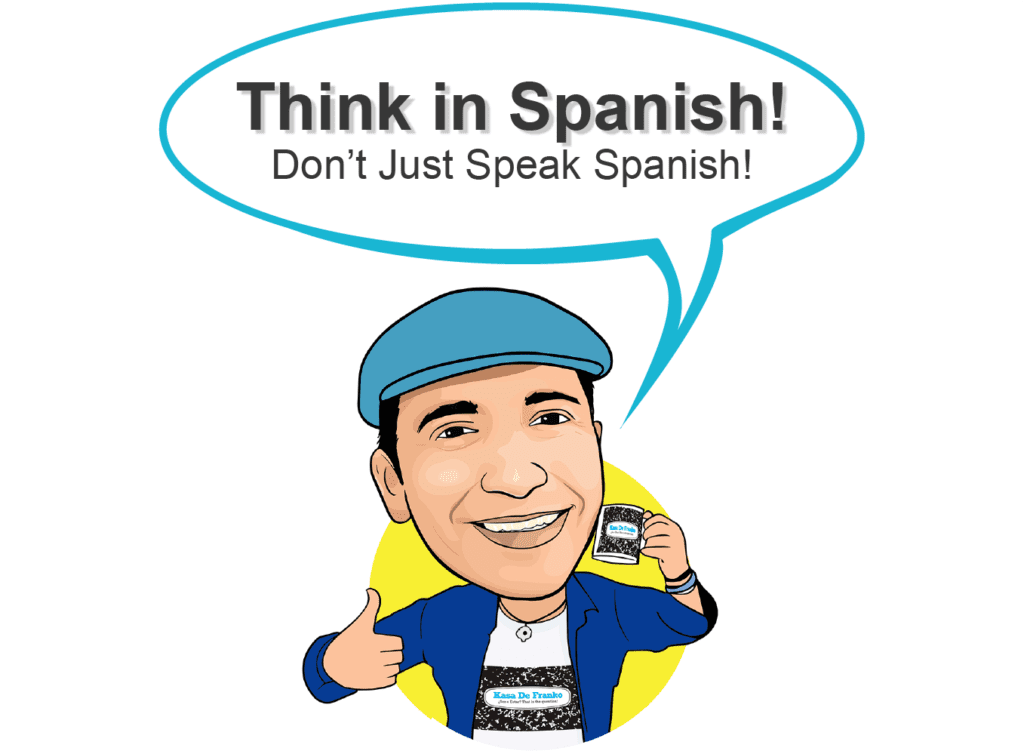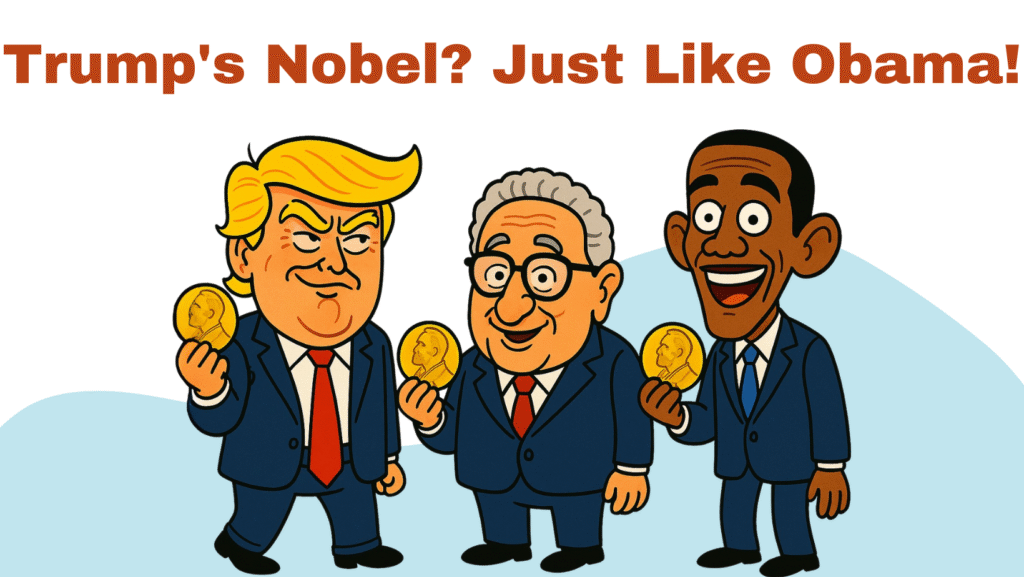
A Near Miss in the Middle East
In 2025, the world braced for another Middle Eastern nightmare. Israel and Iran traded fire — drones, airstrikes, red lines crossed in all directions. Regional militias stirred. The U.S. moved ships. Europe issued statements no one read. For twelve, maybe thirteen, days, we stared down the barrel of something worse than war: a war that was actually about to start (we broke down that tension here). After a tense standoff and a fragile ceasefire, the unexpected headline dropped: the Trump Nobel Peace Prize nomination was real — and the world blinked.
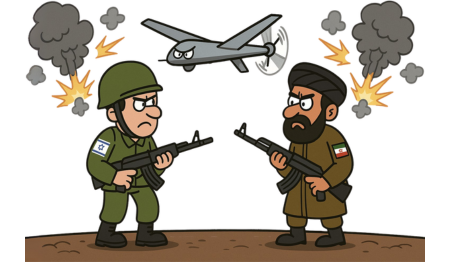
Is The Trump Nobel Peace Prize Nomination For Real?
Apparently, yes. In 2025, after a near-war between Israel and Iran that had the world on edge, former President Donald Trump was nominated for the Nobel Peace Prize. The same man who once threatened to unleash “fire and fury like the world has never seen” is now being considered for an award named after the guy who invented dynamite. No, this isn’t satire. It’s geopolitics — 2025 style.
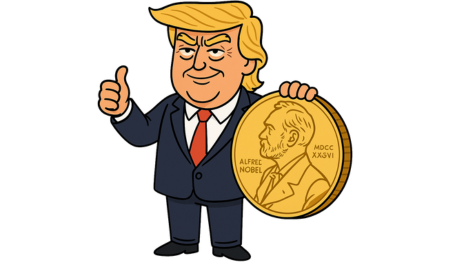
Who Gets Credit for Not Starting a War?
Not a parody headline. Not a tweet. An actual nomination from a Republican congressman who claimed Trump’s “influence” helped prevent war. Because, sure — nothing says “peacemaker” like a man known for threatening to bomb countries “like they’ve never seen before.”
Let’s settle the numbers first. Some call it a twelve-day war. Others say thirteen. Depends on what you count as Day One:
- The first drone strike?
- The first threat?
- The day Netanyahu blinked?
- Or the day the New York Times remembered Yemen still exists?
What matters more is why this number game matters at all. It’s about narrative. Framing.Because if you define war as “when bombs start falling,” it sounds shorter and more contained. But if you count the rising tension, the threats, the movement of warships — the pre-war choreography — you see the broader reality: this wasn’t just a flare-up. This was a full diplomatic heart attack.
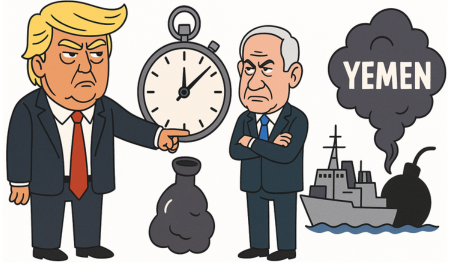
Enter Trump: The Credit Grab
While the dust was settling over Tel Aviv and Tehran, and diplomats in Oman and Qatar were still clearing their throats, Donald Trump took to Truth Social to claim credit — and soon after, the Trump Nobel Peace Prize nomination made headlines.
He didn’t say he negotiated the ceasefire directly.
He didn’t have to.
He simply suggested — in his usual cryptic, bombastic way — that he was the reason the world didn’t go up in flames.
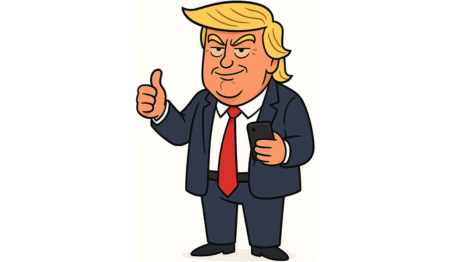
And Then Came Trump Nobel Peace Prize nomination
The logic? Let’s hear from a totally real, definitely anonymous source:
“To be honest, we were just glad he didn’t press anything,” said one imaginary Nobel Committee insider. “It’s 2025 — that’s Nobel-worthy.”
To be clear, any national legislator, professor, or past laureate can nominate someone for the Nobel Peace Prize. Doesn’t mean they’ll win — or even make the shortlist.
But this wasn’t Trump’s first Nobel flirtation. Not even close.
He’s been nominated multiple times before — once for the Abraham Accords, once for North Korea. Always by conservative politicians. Always loudly.
And while the world chuckled, rolled its eyes, or meme’d the news into oblivion, something deeper was happening.
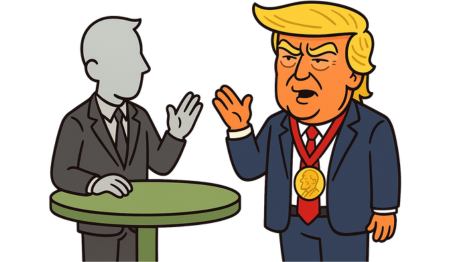
What Is Peace, Really?
Who actually gets credit for peace?
And more importantly: What are we calling “peace” now?
Because in this latest crisis, the real work didn’t happen on stage. It didn’t involve American presidents — past or present — making dramatic speeches or flying to summits.
It happened in the shadows.
If we’re looking for heroes, they weren’t on cable news. They weren’t shouting on stage. They were diplomats from Qatar and Oman.
Qatar has long walked a delicate tightrope: maintaining channels with both Tel Aviv and Tehran, and being the only regional actor who could speak to both without being booed off the stage. It quietly offered security guarantees and shuttled messages through backchannels.
Oman did what it’s always done best: silent, neutral diplomacy. Hosting delegations. Suggesting formulas. Keeping tempers below boiling.
No press conferences. No showmanship. Just results.But of course, “Qatari diplomat facilitates ceasefire” isn’t exactly a viral headline. Meanwhile, “Trump Nominated for Peace Prize” is — regardless of whether he earned it.
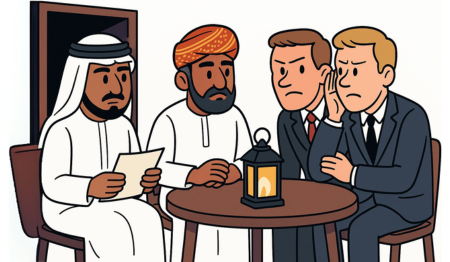
Flashback: Obama and the Nobel for Hope
Let’s rewind to 2009.
Barack Obama, freshly elected, had barely set foot in the White House before being told he’d just won the Nobel Peace Prize.
His achievements?
- Not being Bush
- Sounding hopeful
- Saying “we’re back” in five different languages
Even he seemed stunned. In interviews years later, he admitted he felt he hadn’t earned it — that it was more of a “call to action” than recognition.
Critics saw it differently: a soft, symbolic move by a committee desperate to reset global tone after the Bush era. It was vibes-based foreign policy. Nobel-as-inspiration, not Nobel-as-acknowledgment.
And the backlash? Massive. Especially after the drone strikes started increasing and Gitmo remained open.
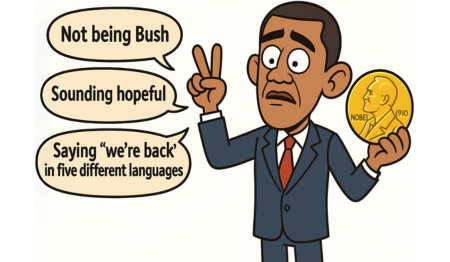
Defining Peace — or Dodging War?
Now fast-forward to Trump. His claim isn’t “I built peace.” It’s “I helped prevent a war.”
So, naturally, people are asking: “Wait — you can win the Nobel for not doing something?”
And the answer seems to be: yes. Maybe. Sometimes.
If Obama won it for the potential of peace, can Trump be nominated for the absence of war?
At this point, we’re not talking about peace as a vision. We’re talking about peace as a brief pause between disasters. Less “world harmony,” more “well, at least nothing blew up today.”
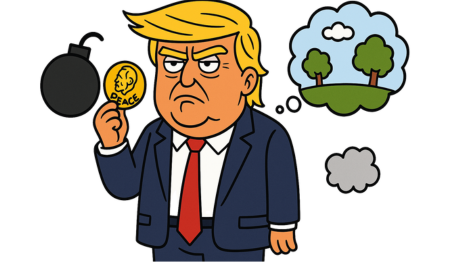
📋 Modern Nobel Peace Scorecard
(Totally unofficial. Tragically accurate.)
✅ Didn’t start World War III — +10 points
✅ Went a full week without threatening a nation — +5
✅ Only hugged a dictator, didn’t kiss — +3
✅ Claimed credit for someone else’s diplomacy — +2
❌ Actually negotiated peace? — -2 (Try not to make everyone else look bad.)
Because clearly, the bar is low.
Coming up next: the Nobel in Literature for someone who didn’t tweet spoilers during a Marvel premiere.
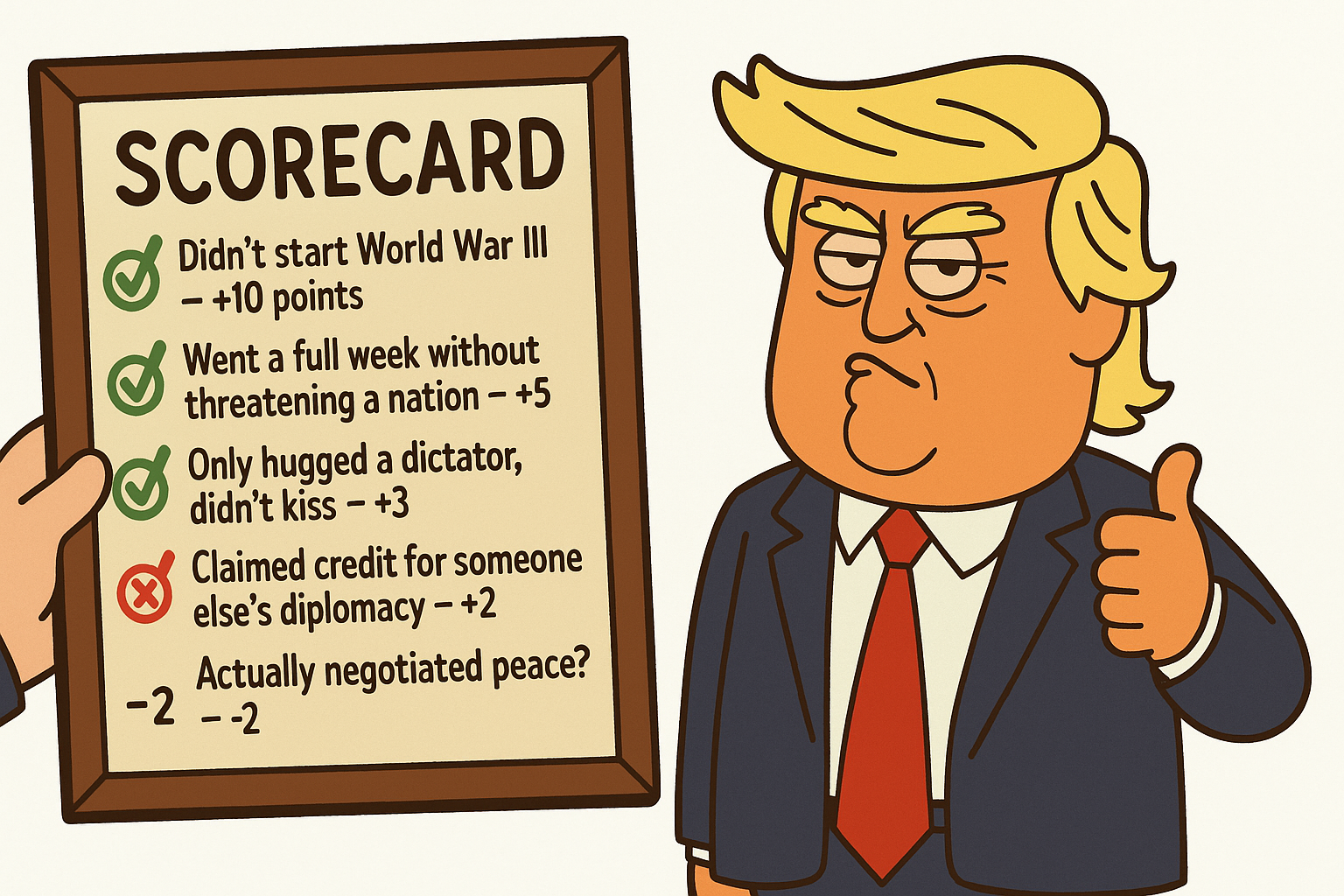
🕊️ Alternative Nobel Peace Categories
Let (Coming soon to a dystopian future near you)🏆 Best Use of a Ceasefire for a Photo Op
🏆 Lifetime Achievement in Not Pressing the Button
🏆 Most Creative Blame Assignment During a Near-War
🏆 Excellence in Strategic Vagueness on Truth Social
🏆 “Didn’t Start It, Still Took Credit” Award (Gold Tier)
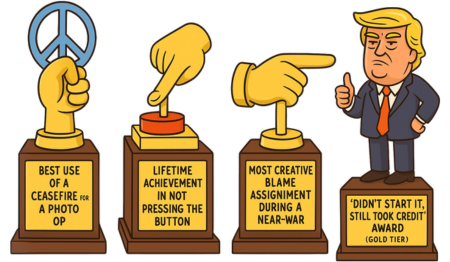
Kissinger, Arafat, and the Nobel’s Complicated Legacy
To be fair, this isn’t the first time the Nobel Peace Prize raised eyebrows (and blood pressure).
Henry Kissinger won it in 1973 — while the Vietnam War was still going on. His co-recipient, Vietnamese negotiator Lê Đức Thọ, rejected the prize, calling it a sham.
Yasser Arafat and Shimon Peres shared one in 1994. By 2000, their “peace process” was buried under rubble.
If you’re wondering how Kissinger — architect of coups and covert wars — got a Peace Prize, you’re not alone.
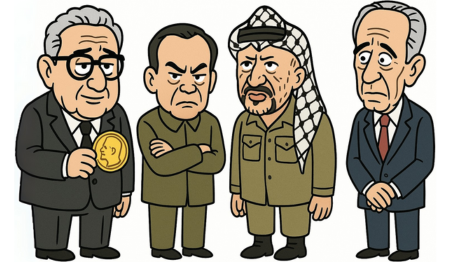
Nobel Doesn’t Always Reward Peace
Maybe it’s because the Nobel doesn’t always reward peace. Sometimes it rewards strategy. Or optimism. Or Western guilt. Or just a good PR campaign.
And sometimes it rewards you for outliving your critics — or outlasting your consequences.
Maybe the Nobel Peace Prize isn’t broken — maybe it’s just mirroring a world that’s forgotten what peace actually looks like. When diplomacy becomes damage control, and restraint feels revolutionary, even silence gets standing ovations.
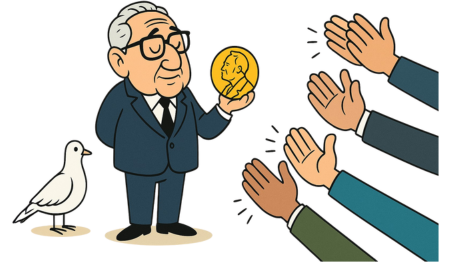
When Peace Prizes Age Poorly
And sometimes it rewards you for outliving your critics — or outlasting your consequences.
Aung San Suu Kyi won it in 1991 for her nonviolent resistance against military rule in Myanmar — only to later face international condemnation for defending what the UN called a genocide against the Rohingya minority.
From Peace to Civil War Abiy Ahmed, Ethiopia’s prime minister, received it in 2019 for ending a conflict with Eritrea — only to plunge into a brutal civil war a year later.The list goes on, raising the same unsettling question: Does the Nobel Peace Prize honor peacemakers — or peace marketing?
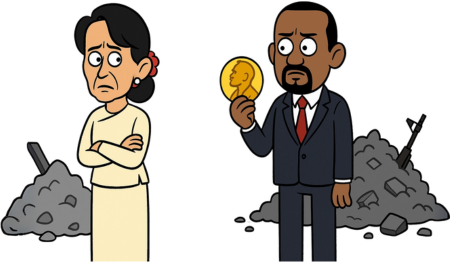
Trump’s Nobel Peace Prize Nomination: Performance vs. Progress
So here we are.
Trump nominated again. Obama’s legacy still being debated. Kissinger… well, still very much a conversation starter.
And the world? Still not at peace.
Maybe that’s the real issue: we keep mistaking the pause for the progress.
Rewarding people not for changing systems, but for delaying explosions.
We hand out medals not when peace is built — but when war is avoided just long enough to breathe.
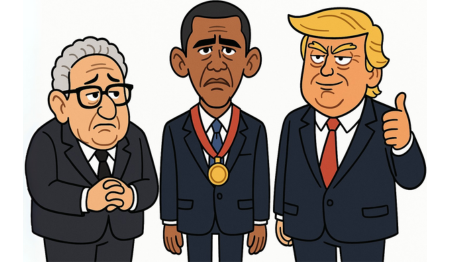
Which Raises the Question:
Is peace just the absence of violence?
Or should it be something more?
If the bar for peace is “not starting World War III,” then sure — nominate Trump.
If “Hope” once earned a Nobel, maybe now “Whew” does too.
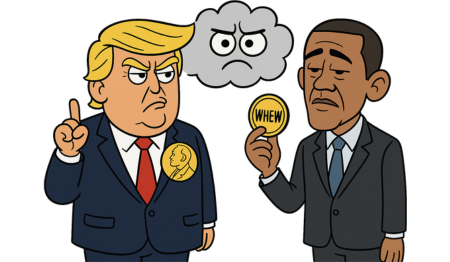
But Maybe It’s Time To Ask:
Is the Nobel Peace Prize about peace?
Or just about the performance of it?
Maybe the next Nobel will go to the world’s most polite ceasefire. And now, the language twist:
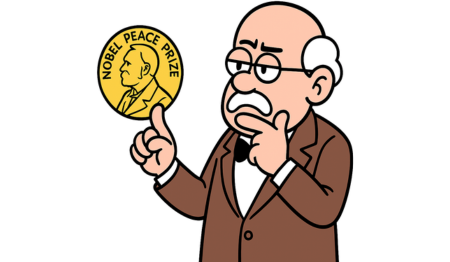
What Does All This Have to Do with Spanish?
Great question. Because at Kasa de Franko and KiDeeF Spanish we don’t just teach language — we decode the headlines, unravel the spin, and throw a little shade in Spanish while we’re at it.
If you read this article and thought, “Wait — this was educational and petty?” — welcome to our method. We believe politics and punchlines go together. So yes, you can expect to discuss Nobel nominations in class — right after learning how to say “He didn’t even press the button” in three different tenses.
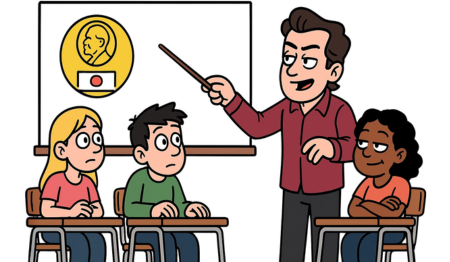
🧠 Sample Vocabulary: Talking about Peace and Prizes in Spanish
| Español | English |
|---|---|
| Premio Nobel de la Paz | Nobel Peace Prize |
| ser nominado/a | to be nominated |
| evitar una guerra | to avoid a war |
| negociaciones diplomáticas | diplomatic negotiations |
| reconocimiento internacional | international recognition |
| tomarse el crédito | to take the credit |
| hacer una pausa, no un progreso | to make a pause, not progress |
| más show que sustancia | more show than substance |
So next time someone wins a peace prize for doing nothing, you’ll be able to talk about it — en español — with just the right amount of sarcasm.
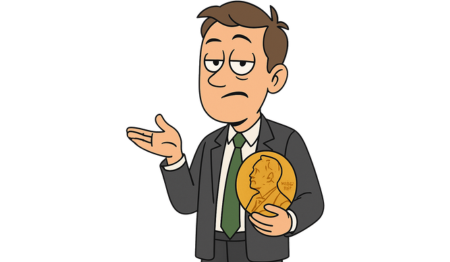
Come for the language: Stay for the commentary!
At Kasa de Franko, we don’t just translate headlines — we unpack them in context, in class, and in your second language. From coups to ceasefires, learn how to talk about it all en español, with just the right amount of sarcasm.
👉 Want to know where this whole Nobel thing started? Who exactly was Alfred Nobel — and what made him go from dynamite to diplomacy? Don’t miss our next article: The Explosive Origins of the Nobel Peace Prize.
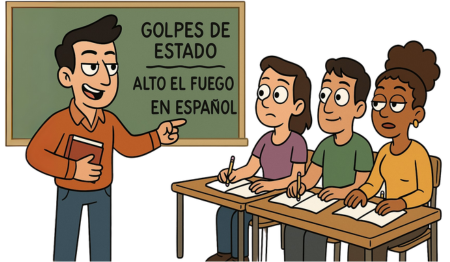
🌎 Want More Like This — But En Español?
If global drama, Nobel irony, and diplomatic plot twists are your thing, you’ll love what we do in Spanish.
👉 Browse our Geopolitics in Spanish articles and take your Spanish from “¿Dónde está la biblioteca?” to “¿De verdad ganó un Nobel por eso?”
And if you’re curious about how we got to this latest Nobel-worthy pause, we’ve already asked the obvious question: Why make war when you can make love? Spoiler: it’s not just about missiles — it’s about missed opportunities.
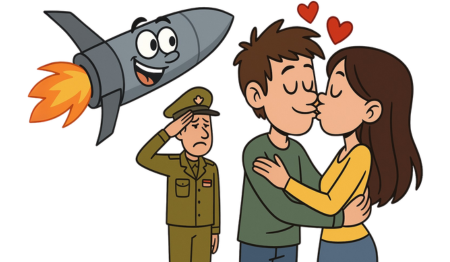
Wanna Talk More Love, Less War In Spanish?
Also: since we’re already talking about war and love, why not brush up on your romantic vocabulary too? From bedroom euphemisms to political pillow talk, our Learn Spanish with Sexy Phrases collection delivers the goods — no ceasefire required.
